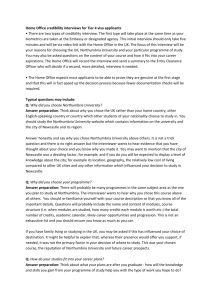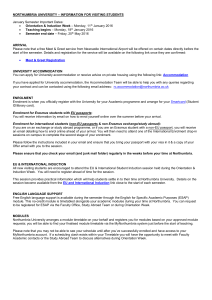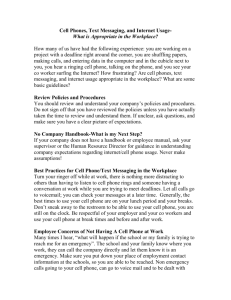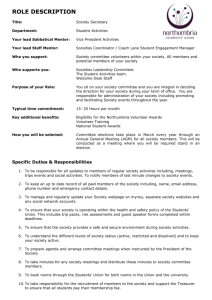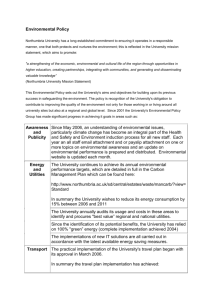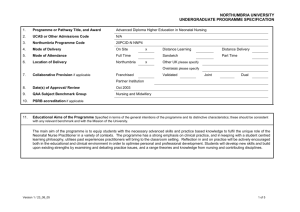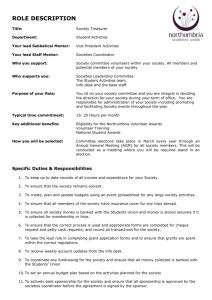File
advertisement
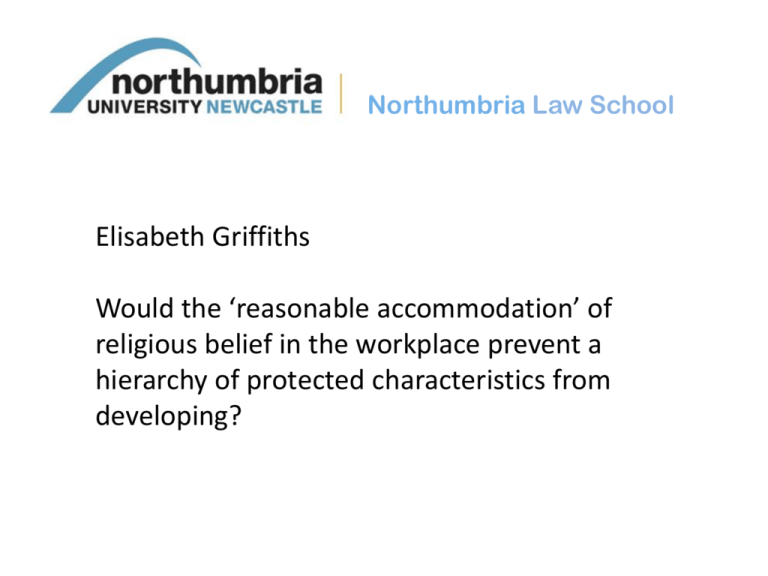
Northumbria Law School Elisabeth Griffiths Would the ‘reasonable accommodation’ of religious belief in the workplace prevent a hierarchy of protected characteristics from developing? Northumbria Law School • • • • • • The public sphere of working life can clash with religious belief and the manifestation of that belief in a number of ways Employers can struggle to understand what is required when trying to follow cases well publicised in the media Evidence of religious employees grappling with the sometimes competing requirements of their jobs and their religious belief The concept of indirect discrimination is not always accessible to employers There is debate that a hierarchy of protected rights is developing because there has been no/limited success in the tribunal for religious discrimination cases Is a duty of ‘reasonable accommodation’ the answer? Northumbria Law School • How might a UK workplace be affected by an employee’s request to have their religious beliefs accommodated in the workplace: • Time off: UK workplaces are organised around the majority Christian calendar, Good Friday, Easter Sunday and Christmas Day – difficulties for minority religious groups/individuals who do not share the same religious holidays • Dress Codes and Uniform: Religious dress /symbols /jewellery • Provision of space for religious observance • Food and diet • Reorganisation of duties to accommodate conscientious objection Northumbria Law School • • • • • • • Is there a hierarchy of protected rights? What does it look like? Equality Act 2010 brings all protected characteristics in to one piece of legislation s. 4. All separate ‘silos’ and equal before the law? No one more important than the other. But are all protected characteristics equal and should they be? is it inevitable that there are differences? Issues of inherent immutable characteristics as opposed to notions of choice Is religion treated differently? Is there a lack of consistency in how cases of religious discrimination are decided as opposed to other protected characteristics? Can be discriminated against because of your religion and you can discriminate against others because of your religion. Religion vs Gender, Religion vs Race, Religion vs Disability, Religion vs Sexual Orientation Northumbria Law School • • • Disability is already different – adding to this notion of a hierarchy. Only protected if you have a disability not if you do not. Duty on employers to make reasonable adjustments, no other protected characteristics has this duty Following Eweida and others v UK interpreting indirect discrimination in accordance with Article 9 will require an employer to justify its PCPs and any decisions it makes about an employee’s request to have their religion or belief accommodated in the workplace on the basis of individual belief. The duty to make reasonable adjustments for disability in s 20 Equality Act 2010 requires just that. The employer must take into account a number of factors in assessing whether the adjustment is reasonable but it is very much based on individual need rather than any notion of all disabled people should be treated the same. Northumbria Law School • The religious beliefs of workers and the right to manifest that belief are protected by law:– • Framework Employment Directive (2000/78/EC); • Equality Act 2010 – direct/indirect discrimination; • Article 9(1) European Convention on Human Rights; Article 9(2) restricts this freedom in so far as that is necessary in a democratic society in the interests of public safety, protection of public order, health or morals, or for the protection of the rights and freedoms of others; • Recent case law – Eweida and others v UK. Northumbria Law School • • • • S. 19 Equality Act 2010 – neutral provisions in the workplace may indirectly discriminate against individuals who choose to manifest their religion through dress, observance of religious holidays, requests for time off for worship and so on, S 19 requires group disadvantage – if no one else shares your belief or how you choose to manifest that belief then any Provision, Criterion or Practice (PCP) in the workplace that disadvantages you because of your religion or belief will not be indirect discrimination. The employer will not have to go on and justify their decision or the PCP, Solitary disadvantage is not protected, although there is now a response to this in Eweida Religion or belief is subjective and how you to choose to practice it can be individual and may not be seen as mandatory within your religion so maybe there is also a hierarchy of religions and clashes between how they are protected – again would reasonable accommodation allow for individual need Northumbria Law School • • • Lucy Vickers discusses the notion of an emerging hierarchy in her 2010 article in Eccles. Law J., 12, 280-303. Literature refers to the way in which the protected characteristics are inherently different. Many refer to religion being a choice as Sedley LJ did in Eweida. Continues with an interesting analysis of the issues in her chapter on religious discrimination in ‘Migrants at Work: Immigration and Vulnerability in Labour Law’ 2014 Cathryn Costello and Mark Freedland. Northumbria Law School • • • Matthew Gibson – applies US and Canadian models of reasonable accommodation to UK case law to suggest this is the way forward C.L.J 2013, 72(3), 578-616 Gwyneth Pitt – Eweida and others v UK falls short of suggesting that employers have a duty of reasonable accommodation and it should be strongly resisted. Pitt argues this is about a hierarchy between direct and indirect discrimination not between protected characteristics; Ind Law J (2013) 42 (4): 398 Robert Wintemute’s analysis of accommodation (2014) 77(2) MLR 223-253 – “workable test for assessing justification” based on a liberal harm analysis and proposing a middle path. Northumbria Law School • What I am particularly interested in is what can employers do about this and what should they do? Employers are the ones who have to balance these competing interests and accommodate diversity in the workplace. Northumbria Law School • • • • • • • • • • • Why should employers accommodate religion (or any protected characteristic) in the workplace? Growth in UK immigration Increased internationalisation and diversity of the workforce Allows for individual consideration of religious conviction Respect for dignity and religious liberty Allows for co-existence of protected characteristics rather than competing hierarchies Raises ethical issues particularly in the day to day operations of a business Improved employee well being Improves a company’s public image Helps with recruitment and retention of staff Social inclusion – see Hugh Collins 66 Mod. L. Rev. 16 2003 Northumbria Law School • How should employers decide? What is relevant to the notion of reasonable accommodation? • Employer • • • • • • • • • Cost – direct and indirect Undue burden on the business – disruption and wider impact, (too much regulation – real or perceived) The size of the employer Administrative resources of the employer Health and safety considerations The inter-changeability of the workforce Public relations Notion of harm – direct and indirect Equity Northumbria Law School • What is relevant to the religious employee? • • • Morale problems and disadvantage to the employee if refused The nature of the job and the extent of the responsibilities aligned to that job Exclusion from the job market altogether especially problematic for minority religious groups where there may already be a lack of social inclusion e.g. Muslim women • What is relevant to third parties/other employees? – competing interests, substantial interference with the rights of others, morale problems Northumbria Law School • USA: Under Title VII of the Civil Rights Act an employer has the legal duty to reasonably accommodate the practices, observances or beliefs of his or her workers unless doing so would amount to an undue hardship. This has been interpreted as a de minimis standard – cost to the employer “something beyond inconvenience”. Northumbria Law School • Canada: reasonable accommodation crosses all protected characteristics in anti-discrimination law. Employers know they have to accommodate if there is discrimination. The next question is would the employee’s accommodation impose “undue hardship” on the employer. • Would this work in the UK and would it remove this notion of hierarchy as the individual need of the employee is taken into account? • UK position in Europe – already a difference e.g. France Northumbria Law School • • • • • • EHRC research report 84, 2012 – areas of difficulty – competing claims, fear of litigation, assessing proportionality, uncertainty as to what is protected by law; Alice Donald et. al. Solitary expression of religion vs group disadvantage Mandatory religious requirements vs personal preference Perception that religion or belief comes below sexual orientation in the hierarchy of protected rights Protection of non-innate and chosen beliefs vs innate characteristics It is argued that the introduction of a duty of reasonable accommodation would overcome some of these issues. Research suggests that is what employers want (2012 EHRC) although it should be emphasised that the sample is small in this research (47 respondents) and the notion of reasonable accommodation was not put to employers as a legal duty as in the Canadian example. Northumbria Law School • • 2012 EHRC research 70% of the respondents were from the public sector, 23% from the private sector. Almost 90% of the respondents were from large organisations with 500 or more staff. 89% had their HQs in the UK. How would the answers differ if more SMEs were interviewed? Should the views of a larger number and wider range of employers be sought particularly in the private sector. Case study analysis about management decisions. • 2015 EHRC call for evidence • Northumbria Law School • Conclusions?? • More analysis needed

